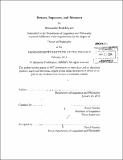| dc.contributor.advisor | David Pesetsky. | en_US |
| dc.contributor.author | Podobryaev, Alexander | en_US |
| dc.contributor.other | Massachusetts Institute of Technology. Department of Linguistics and Philosophy. | en_US |
| dc.date.accessioned | 2014-05-23T19:38:25Z | |
| dc.date.available | 2014-05-23T19:38:25Z | |
| dc.date.copyright | 2014 | en_US |
| dc.date.issued | 2014 | en_US |
| dc.identifier.uri | http://hdl.handle.net/1721.1/87498 | |
| dc.description | Thesis: Ph. D., Massachusetts Institute of Technology, Department of Linguistics and Philosophy, 2014. | en_US |
| dc.description | Cataloged from PDF version of thesis. | en_US |
| dc.description | Includes bibliographical references (pages 115-120). | en_US |
| dc.description.abstract | This dissertation is about person features, their representation and interpretation in natural language. I will argue that there are several ways in which person features can be represented and interpreted. Most importantly, I will provide evidence for a kind of person features that are parts of referential indices of pronouns, constraining possible values that the assignment function maps the indices to (cf. Minor 2011, Sudo 2012). It is this particular way of representing person features that allows to postulate operators that manipulate the assignment in way that all pronouns with certain person features are affected. Such operators, as I will demonstrate, do exist. They come in at least two varieties, imposter operators and monster operators. Imposter operators manipulate the assignment by making all free 1st person indices (or all 2nd person indices) undefined in their scope, and when 1st or 2nd person indices are undefined 3rd person indices can be used instead. Building on the observations from Collins and Postal 2012, I will argue that we can interpret the 3rd person pronoun in sentences like Yours truly's dissertation wasfiled a week before his birthday as referring to the speaker because there is a silent imposter operator that suppresses 1st person indices in the domain that includes the imposter yours truly and the pronoun. Furthermore, it is due to the presence of the same operator that the 1st person pronoun and the 3rd person pronoun in sentences like Yours truly filed his dissertation before my birthday cannot be understood as coreferential. Another likely candidate for a person-sensitive assignment-manipulating operator is the monster operator in Mishar Tatar (strictly speaking, it is not a Kaplanian monster, but I will use the term anyway). This operator is responsible for the fact that a subclass of indexical pronouns in this language may shift to denote the coordinates of the context embedded under an attitude predicate. Thus, the dissertation contains two case studies: one on imposters in English (Chapter 1) and one on indexical shifting in Mishar Tatar (Chapter 2). The overall hope is to build a case in which possible interpretations of person pronouns can inform us about their syntactic representation. | en_US |
| dc.description.statementofresponsibility | by Alexander Podobryaev. | en_US |
| dc.format.extent | 120 pages | en_US |
| dc.language.iso | eng | en_US |
| dc.publisher | Massachusetts Institute of Technology | en_US |
| dc.rights | M.I.T. theses are protected by copyright. They may be viewed from this source for any purpose, but reproduction or distribution in any format is prohibited without written permission. See provided URL for inquiries about permission. | en_US |
| dc.rights.uri | http://dspace.mit.edu/handle/1721.1/7582 | en_US |
| dc.subject | Linguistics and Philosophy. | en_US |
| dc.title | Persons, imposters, and monsters | en_US |
| dc.type | Thesis | en_US |
| dc.description.degree | Ph. D. | en_US |
| dc.contributor.department | Massachusetts Institute of Technology. Department of Linguistics and Philosophy | |
| dc.identifier.oclc | 879667909 | en_US |
